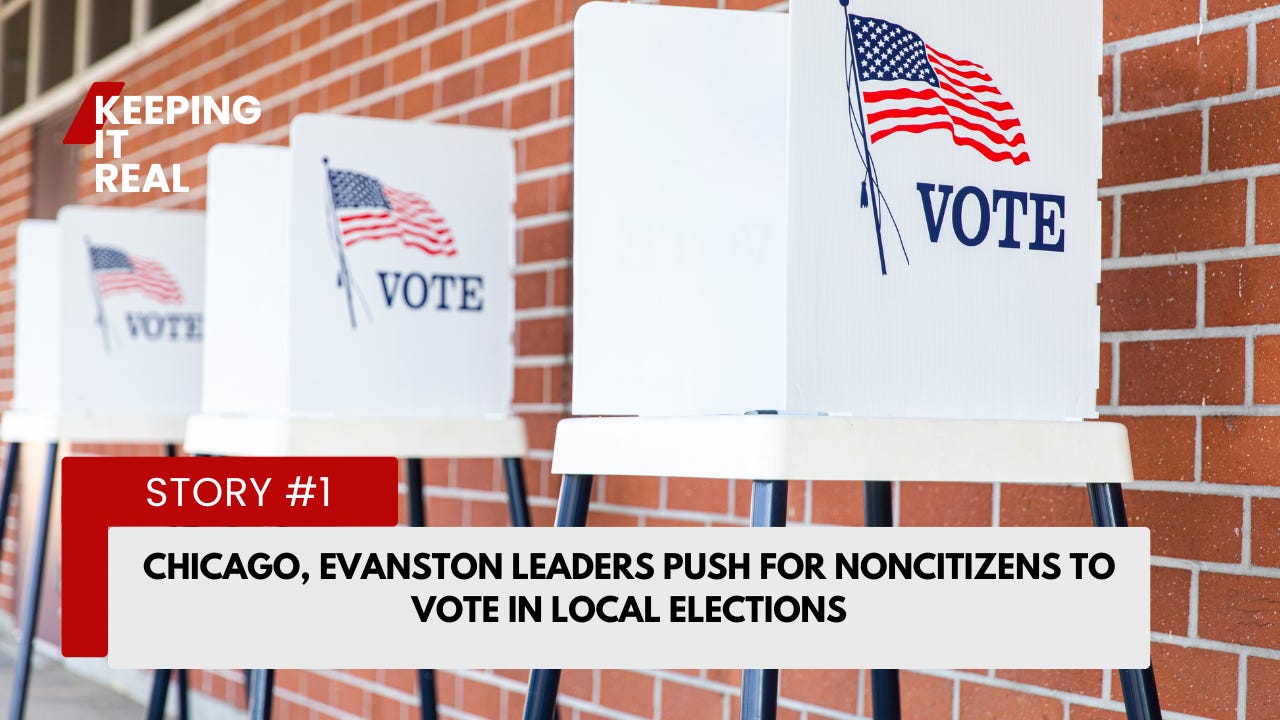I left the mainstream media to fight the narratives. Support my mission by becoming a paid subscriber. It’s $5 a month; you can quit at any time.


CHICAGO, IL - Chicago has over 43,000 migrants and about 425,000 noncitizens are in Illinois, so some elected leaders in Chicago and Evanston want to give them voting rights in local elections while some state senators want to prevent their votes.
Noncitizens are currently barred from voting in federal elections by federal law and state elections by the Illinois Constitution. But changes could be made in who is allowed to vote in local elections, such as school boards and municipal offices.
State Sen. Celina Villanueva, D-Chicago, in 2023 introduced Senate Bill 1345, which would have allowed noncitizens to vote in local school board elections if they had children attending the school district. Villanueva represents the most heavily Hispanic senate district in Illinois and said migrant students make up at least 40% of the Chicago Public Schools student body. Click here to read more.

CHICAGO, IL - California fast food franchise owners are being forced to cut their employees’ hours following Gov. Gavin Newsom’s (D) $20 minimum wage law, which went into effect in April.
Lawrence Cheng, whose family owns several Wendy’s restaurants in southern California, has had to fill in behind the register to make up for the dramatic cuts, he told the Associated Press. While he used to have “nearly a dozen employees” working the afternoon shift at his Fountain Valley location, he is reportedly down to just seven per shift.
“We kind of just cut where we can,” Cheng told the outlet. “I schedule one less person, and then I come in for that time that I didn’t schedule and I work that hour.”
Before Newsom’s mandate, he was paying his 250 workers $16 an hour. Now, the only way he can keep up with paying them $20 is to simply have them work fewer hours. Click here to read more.
PROMOTION:
Click here to order your radios. Use promo code “BONDY10” to get 10% off.

DALLAS, TX- Border agents are warning of a new tactic being used to help people cross into the U.S. without permission: Smugglers are hiring charter buses to help evade detection.
In a situation awareness bulletin exclusively obtained by NewsNation, agents are being warned of the new tactic. Smugglers use charter buses, like the ones used for group travel and tours, to transport migrants who have crossed into the U.S. illegally, expecting weak immigration inspects that will allow them to pass through.
People were instructed by a guide working for the cartel to board the charter buses at a Pilot gas station in Eagle Pass, Texas, after having crossed into the U.S. between points of entry. The smugglers’ goal is to get people into the interior of the country past the 100-mile area where immigration officials are allowed to conduct warrantless stops.
Agents at a nearby checkpoint flagged a charter bus for secondary inspection, where agents discovered eight people on board who did not have documentation. Click here to read more.

LANSING, Mich - In her book True Gretch, released Tuesday, Gov. Gretchen Whitmer once again apologizes for violating her own Covid social distancing executive orders in May 2021.
Her explanation begins on page 134 of the slight 158-page read, published by Simon and Schuster and retailing for $26.99. The book is subtitled “What I’ve Learned About Life, Leadership, and Everything In Between.”
“I’ll end this chapter with one of my biggest flubs in politics,” Whitmer and her collaborator Lisa Dickey wrote. “It was an own goal, as they say in soccer, a totally avoidable mistake that was mine and mine alone.”
The Midwesterner founder Kyle Olson broke the story while reporting at Breitbart.
“Michigan Gov. Gretchen Whitmer (D) hit the bar this weekend and violated her own coronavirus orders, according to a photo Breitbart News has exclusively obtained,” Olson reported. Click here to read more.

SPRINGFIELD, OH - – Large numbers of people entering or living in America illegally are exacerbating the housing crisis, including in areas like Ohio far from the border.
City Manager Bryan Heck of Springfield sent an urgent letter to U.S. Sens. Tim Scott, R-S.C., and Sherrod Brown, D-Ohio, requesting federal aid. Despite the city’s ongoing advancements in housing projects, the sheer number of migrants arriving and residing in the area has strained resources to their limits.
“Springfield has seen a surge in population through immigration that has significantly impacted our ability as a community to produce enough housing opportunities for all,” Heck wrote. “Springfield’s Haitian population has increased to 15,000 – 20,000 over the last four years in a community of just under 60,000 previous residents, putting a significant strain on our resources and ability to provide ample housing for all of our residents.” Click here to read mor




















